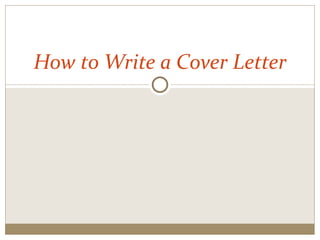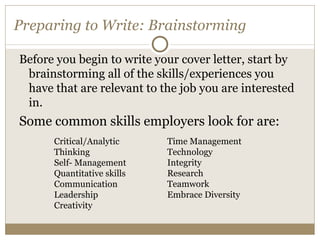How to Write a Cover letter
- 1. How to Write a Cover Letter
- 2. Objectives The objectives of this tutorial are: to explain the purpose of cover letters, show how to properly market yourself to employers, demonstrate your understanding of employerŌĆÖs needs, and demonstrate your writing ability.
- 3. The Purpose of a Cover Letter Cover letters are meant to market yourself to potential employers by expounding upon your resume through: Highlighting key skills and qualifications. Demonstrating an understanding of the employerŌĆÖs needs. Demonstrating your writing ability.
- 4. Prepare for Writing: Researching To begin the process of writing a cover letter, first start by researching the employer of the job you are interested in. Some useful tools for researching are: The companyŌĆÖs website Idealist.org Your schoolŌĆÖs career services website for researching employers
- 5. Preparing to Write: Brainstorming Before you begin to write your cover letter, start by brainstorming all of the skills/experiences you have that are relevant to the job you are interested in. Some common skills employers look for are: Critical/Analytic Thinking Self- Management Quantitative skills Communication Leadership Creativity Time Management Technology Integrity Research Teamwork Embrace Diversity
- 6. Preparing to Write: Mapping Your Content After researching the job and brainstorming select one or two experiences from your resume that demonstrate these skills. An effective method for this is Find key words in the job description that describe what the employer is looking for and match them with your experience. You can draw from a variety of experiences to showcase your skills including internship, school-year employment, and volunteer work
- 7. Common Transferable Skills As a college student you may not have a lot of experiences on your resume but you have developed strong transferable skills to any work environment. Common Transferable Skills Sought : Critical/analytical thinking Creativity Self-Management Time Management Quantitative Skills Technology Communication Integrity Leadership Embrace Diversity Research Teamwork
- 8. Formatting Your Cover Letter: Heading Your Address Line #1 Your Address Line #2 Date Contact Name Contact Job Title Company Company Line #1 Company Line #2 Your Address Heading
- 9. Introductory Paragraph Your introductory paragraph should include the position youŌĆÖre applying to and where you learned about it. Also include a couple of things about the employer that personally interest you. Develop a ŌĆ£thesisŌĆØ statement about your skills and qualifications.
- 10. Formatting Your Cover Letter: Opening Sentence Samples Sample 1: I am forwarding my materials for consideration for the Program Coordinator position at Leadership Enterprise for a Diverse America (LEDA). Please find enclosed (or attached if sending by email) my resume, and the details of three references. As you will see from my resume, I have great program development, administrative, and event planning experience.
- 11. Formatting Your Cover Letter: Opening Sentence Samples Recent Grad: My proven track record of successfully performing complex analyses on various corporations makes me an ideal candidate for the Analyst opportunity that you listed through the Name University Career Services Office. I would like to express my interest in a position as editorial assistant for your publishing company posted on xyzwebsite.com. As a recent graduate with writing, editing, and administrative experience, I believe I am a strong candidate for a position at the 123 Publishing Company.
- 12. Body Paragraph Your body paragraph should not exceed 1-2 concise paragraphs explaining your most relevant qualifications. Use specific examples: Situation ŌĆō Action ŌĆō Result. Focus on why you are interested in the position and how you can add value to their institution. Always be sure to connect your qualifications back to the job you are applying to. Remember to use the keywords you identified in the job description.
- 13. Closing Statements In your closing paragraph or statements be sure to include: A summary statement restating why you are interested and qualified for the job. Refer to your resume. Include that you are looking forward to speaking with them further about the position.
- 14. Sample Closing Statements Sample 1: I have enclosed my resume, and will call within the next week to see if we might arrange a time to speak together. Thank you so much for your time and consideration. Sincerely, Jane Jones Sample 2: I am excited about the opportunity to join the ABCD team as it moves to the center of the print media conversation. Thank you for your time and consideration. Please free to contact me via email at [email_address] or by phone at (555) 555-5555. Sincerely, Jane Jones
- 15. Writing Tips Outline your letter. Focus on what YOU have to offer THEM. Read your cover letter aloud. Check, check, and re-check your cover letter for grammar and spelling mistakes.
- 16. Additional Resources www.ledascholars.org under the ŌĆ£Scholar SupportŌĆØ page. GREAT Cover Letter Writing Handout http://www.dartmouth.edu/~csrc/pdfs/job_search_letters.pdf Cover Letter Templates http://jobsearch.about.com/od/samplestudentletters/a/studentcoverletters.htm














![Sample Closing Statements Sample 1: I have enclosed my resume, and will call within the next week to see if we might arrange a time to speak together. Thank you so much for your time and consideration. Sincerely, Jane Jones Sample 2: I am excited about the opportunity to join the ABCD team as it moves to the center of the print media conversation. Thank you for your time and consideration. Please free to contact me via email at [email_address] or by phone at (555) 555-5555. Sincerely, Jane Jones](https://image.slidesharecdn.com/coverletter-110106141807-phpapp01/85/How-to-Write-a-Cover-letter-14-320.jpg)

